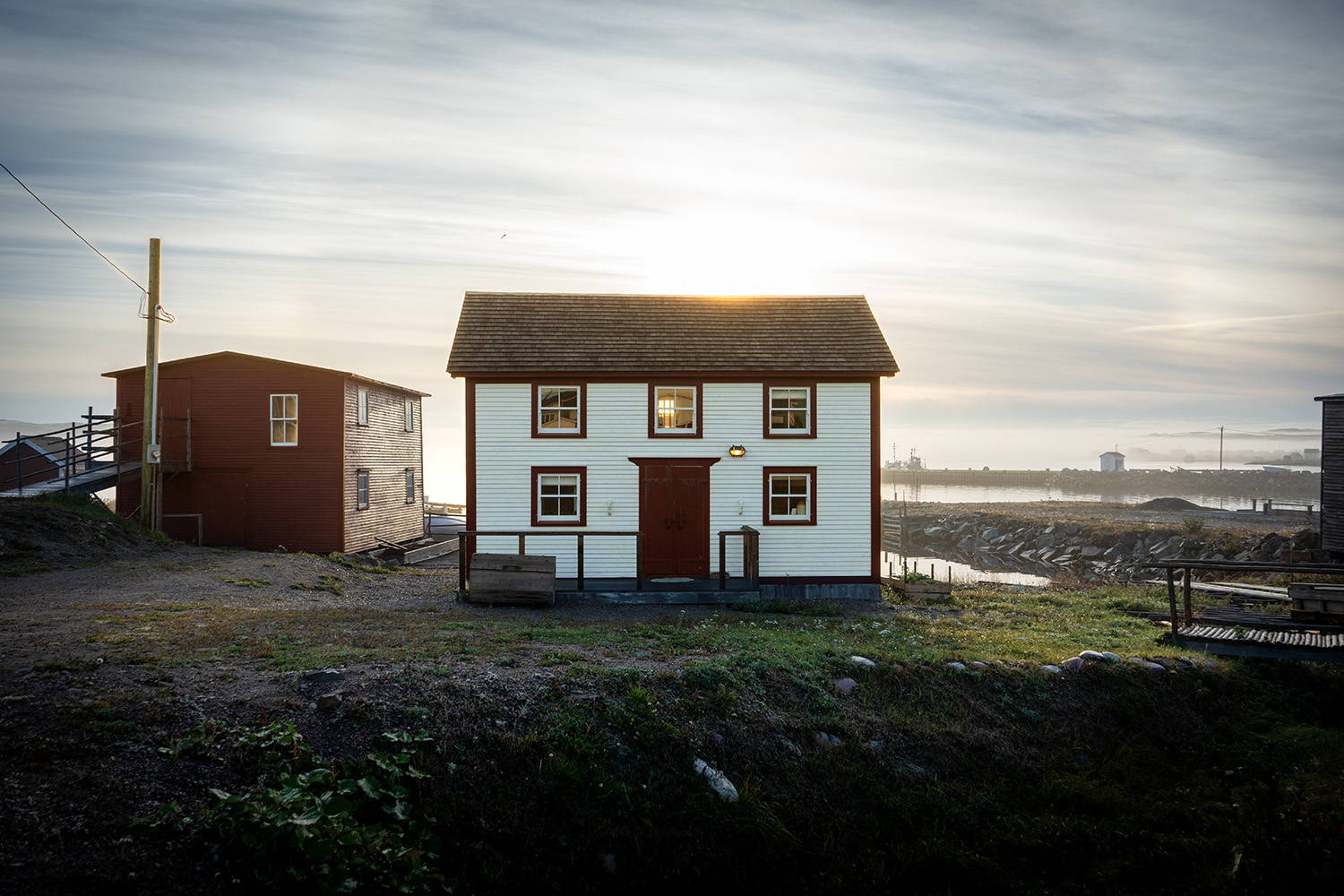Connecting the heritage saltbox and modern urban experience
In outport Newfoundland, it was not uncommon for larger families to live in tight quarters, with multiple generations sometimes living in a single-family saltbox or biscuit box home. These small houses were tight on space but big on creating a welcoming and social home that brought people close together, with friends and family often dropping in unannounced from dawn to dusk. The Premises Collection was designed to connect traditional salt box living with the modern urban lifestyle and reflect shared experiences across time and place.
Smaller in scale and quieter in aesthetics than our Fogo Island Inn at Home Collection, this new line of furniture emphasizes the dematerialization of objects to minimize resource consumption, while prioritizing longevity. Each piece was designed with an appreciation of the ‘super normal’ that prioritizes the utility and tranquility desirable in contemporary homes. The new collection of furnishings has human-scaled proportions and fits into urban lofts as easily as the salt box houses of outport Newfoundland. Connecting past to present to future, the Premises collection expresses the value of the permanent over the disposable and is made to be trusted and treasured.
The Name
Spotted among the saltbox houses of outport Newfoundland were fishing premises, comprising sheds, fishing stages, wharfs, and flakes. These integral outbuildings along the shore were where fishers processed their catch. Our new collection's name, "Premises," pays homage to Fogo Island's history and resilient communities, recognizing that these premises were the lifeblood of their existence.
There are four design series within the Premises Collection: Stilt, Shed, Bridge, and Stage. Each series tells a story, revitalizing time-honoured design concepts (see Fogo Island Design Fundamentals) and sharing Fogo Island’s cultural legacy.
Stilt Series
Drawing direct inspiration from “The Children of Fogo Island” from the Fogo Process – a film series created by the National Film Board of Canada in the 1960s and 70s in dialogue with Fogo Islanders – Japanese designer Wataru Kumano reimagined the unsteady legs of the walking stilts used in play by kids on Fogo Island. The Stilt Series is completely contemporary while embodying an important cultural context. Made using the off cuts from other furniture pieces, the series plays on the rough lines and whimsical nature of these traditional toys.
The Stilt Series also reflects the traditional architecture and building methods of outport Newfoundland, in which structures stand on stilts to adapt to the rocky topography and safeguard against coastal weather. The stilts, or “shores,” that underpin many of the buildings on Fogo Island minimize the footprint and impact on rocks, lichens, and berries, while providing unobstructed views of the scenic sea and landscape.
Shed Series
In outport Newfoundland, sheds are small, typically wooden structures used to store fishing gear and tools, while providing a space to work. Sheds became a central, informal gathering place where people assembled to share stories, play music, and enjoy each other’s company.
The Shed Series, by Canadian designer Katrina Tompkins, is inspired by traditional three-legged stools. These stools were used as task chairs, with three legs that stabilized on the uneven ground found in sheds, stages, or even outdoors. The Shed Series is unornamented, built by hand, and ready to work.
Bridge Series
In Newfoundland, a "bridge" can refer to a raised walkway connecting structures within a fishing stage. Stages are essential for processing and storing catches, and the bridge facilitates movement between different areas, providing a vantage point for overseeing operations. Like the bridge of a fishing stage, the Bridge Series was designed with purpose and mobility in mind.
The Bridge Series by Swiss designer Anthony Guex features wide horizontal slats inspired by the bridges of fishing stages and Fogo Island’s vernacular structures. An enduring essential, the series is perfectly proportioned and designed to dematerialize by using the least amount of materials possible.
Stage Series
The Stage Series, also designed by Anthony Guex, is inspired by the frame of the fishing stage, an iconic and integral part of outport Newfoundland. Within fishing premises, stages stand delicately and perilously above the water. Stages are where the inshore fishery brought its bounty to prepare salted cod for trade with merchants. Designed for architecture enthusiasts, the exposed structure of the Stage Series directly mimics the exposed structure of the fishing stages on Little Fogo Islands.
Modern Quilting
The compact furniture in the Premises Collection embodies the simplicity of traditional homes, complemented by modern quilt designs. The new quilts keep the integrity of centuries-old quilting principles like economically using remnant materials, while bringing a contemporary twist to heritage patterns. As each piece of furniture in the Premises Collection, our modern quilt patterns revitalize timeless design concepts and narrate a story that captures the cultural legacy of Fogo Island.

